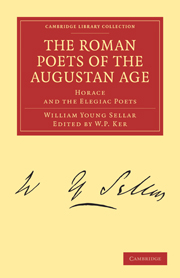CHAPTER II - GALLUS, TIBULLUS, LYGDAMUS, SULPICIA
Published online by Cambridge University Press: 07 September 2011
Summary
The earliest in point of time of the four principal elegiac poets of Rome was Cornelius Gallus. He was distinguished, like Asinius Pollio, in the military and political, as well as the literary history of his age. As his works are lost, we can judge of the share he had in shaping the Roman elegy, and of the quality of his poetical art and genius, only from the impression he has left on the writings of contemporary poets and later critics of literature.
The outward facts of his life are briefly these. He was born at Forum Julii in Gallia Narbonensis in 69 b.c. In the year 41 b. c. he was, along with Pollio and Varius, one of the three commissioners engaged in the division of the lands in the neighbourhood of Mantua. Ten years later he highly distinguished himself in the siege and capture of Alexandria, and was appointed the first Prefect of Egypt. He was deprived of his government in consequence of his self-assertion and disloyalty; and being accused among other things of speaking disrespectfully of Augustus, he fell into disgrace, was put under a social ban, and committed suicide in the year 26 b.c. His literary reputation was made before the time of his greatness and fall, first by a translation of some work of Euphorion, ‘the Chalcidian Shepherd,’ as Virgil calls him in the Eclogues; later by four books of elegies, under the name of ‘Lycoris.’ In these he bewailed his desertion by Cytheris, the famous actress, the mistress of Antony and several others, who is mentioned by Cicero in one of his letters (Fam. ix. 26) as being present at an entertainment given by P. Volumnius Eutrapelus where Cicero was a guest.
- Type
- Chapter
- Information
- The Roman Poets of the Augustan AgeHorace and the Elegiac Poets, pp. 221 - 259Publisher: Cambridge University PressPrint publication year: 2010First published in: 1892



